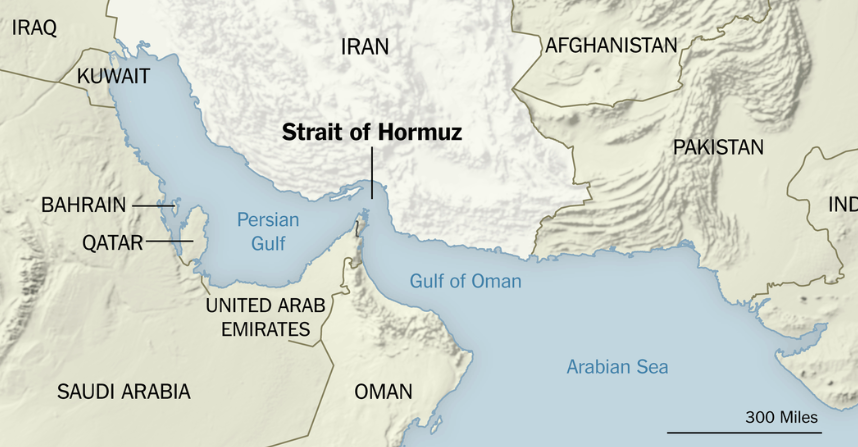As Iran and the United States move toward a confrontation that is looking increasingly inevitable, Iranian political and military leaders have once again raised the prospect of closing the strategic Strait of Hormuz.
The Strait of Hormuz is the world’s most important oil “artery” through which 30 per cent of the world’s oil supply passes. Therefore, its closure, even for a brief period, will impact massively on the global economy and by extension it will touch off longer term political ripple effects.
This is not the first time that Iranian leaders have threatened to close the Straight as a defensive measure against potential US aggression. The last time the idea was floated was back in January 2012 when the Obama administration imposed a range of sanctions against the Islamic Republic.
But just how credible is the Iranian threat from military, strategic and political standpoints? More specifically, will the Islamic Republic attempt to close the Strait due to tactical and operational necessity during a short and sharp war or does it envisage the closure as part of a broader strategy during a less dramatic but more drawn-out conflict with the US?
Most likely Iranian political and military commanders have developed a range of options envisaging multiple forms of conflict with the US and the closure of the Strait of Hormuz is central to all of them.
Unity of vision
It is a measure of the mounting pressure on Tehran that normally critical hardliners and conservatives are rallying round the centrist President Hassan Rouhani. Indeed, Rouhani’s ambiguous threat to close the Strait of Hormuz has been enthusiastically embraced by the commanders of the Islamic Revolutionary Guards Corps (IRGC).
IRGC Commander, Major General Mohammad Ali Jafari, praised Rouhani for standing up to the American threat of cutting off Iran’s oil supply as part of a new sanctions regime. More importantly, the Commander of the IRGC Quds Force, Major General Qassem Soleimani, glorified the Iranian president by proclaiming that this is the “Rouhani we all knew, know and want to know”.
The convergence of IRGC commanders’ rhetoric with the declared positions of the president is striking in the context of real differences between the national security doctrines of the Revolutionary Guards and the Iranian government.
The convergence is unfolding against a wider backdrop of conservative support for the embattled Iranian president. As the Iranian economy feels the pressure of impending severe sanctions, and as the potential political repercussions of the sanctions become clearer, the entire Iranian establishment is rallying behind the government.
This rare sign of unity is a measure of just how seriously the Islamic Republic and its supporters view the threat from the Trump administration. Not only is the US determined to destroy the landmark nuclear deal of 2015, but the US Secretary of State, Mike Pompeo, recently issued an ultimatum to Iran which amounted to a call for total surrender.
Needless to say, the Trump administration’s fantasy of reducing Iran to a vassal state will never be realised. The Islamic Republic is unlikely to agree to a new nuclear deal on Trump’s terms, let alone negotiate over its regional policy and ballistic missiles capability. The course is set for a major confrontation with a possible military component. It is in this context that the threat to disrupt shipping in the Strait of Hormuz assumes immediate significance.
Measure of last resort?
Any attempt by Iran to close the Strait of Hormuz will elicit a military response by the United States. American military commanders have repeatedly articulated their determination to keep the waterway open to ensure “freedom of navigation” and the “free flow of commerce”.
Based on this inevitable scenario Iranian politicians and military commanders hope to deter the US from pursuing crushing oil-related sanctions by evoking the possibility of war following from Iran’s closure of the Strait.
This deterrent strategy is clearly evident in the stance taken by the conservative deputy speaker of Parliament (Majlis), Ali Motahari, who said today that Iran’s threats to close the Strait will bear “positive” results. In other words, Iranian leaders expect these threats to produce the desired impact on Washington’s strategic calculus.

There is some evidence that the tough rhetoric emanating from Tehran is indeed impacting on the position of the Trump administration as it has been reported that the US is softening its demand on countries to stop importing Iranian oil by 4 November.
But in view of the volatility of the Trump administration – and specifically Donald Trump’s mercurial leadership style – nothing can be taken for granted. The IRGC clearly believes that its doctrine of unconventional naval warfare – as embodied by its peculiar naval capabilities spearheaded by fast attack boats – is sufficient to not only close the Strait but equally important to successfully engage American naval assets over a sufficiently long period.
At first glance the disparity between the IRGC navy and American naval assets in the Persian Gulf is stunning. To illustrate the point, this is a case of small fast attack boats ranged against mighty US destroyers and aircraft carriers.
But what the IRGC navy lacks in scale and technology it compensates for with plenty of guile, asymmetric tactics and above all a fanatical and unwavering devotion. Indeed, this relatively small naval force has repeatedly humiliated the British and American navies in the Gulf.
Whilst career diplomats in the Iranian foreign ministry worry aloud about the potential consequences of the closure of the Strait of Hormuz, there can be little doubt about the Islamic Republic’s will to force a confrontation if it believes the US is set on strangling the Iranian economy.
Via Middle East Monitor






